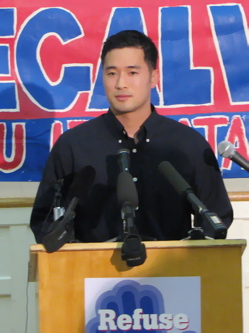Submitted by Sarah Olson on
 Army First Lieutenant Ehren Watada saw his case move one step closer to resolution earlier this month when a federal court issued a preliminary injunction against a second court martial. The Army's prosecution of the first officer to publicly refuse to deploy to Iraq has been in legal limbo since a February court martial ended abruptly when the military judge threw out a stipulation agreement and declared a mistrial.
Army First Lieutenant Ehren Watada saw his case move one step closer to resolution earlier this month when a federal court issued a preliminary injunction against a second court martial. The Army's prosecution of the first officer to publicly refuse to deploy to Iraq has been in legal limbo since a February court martial ended abruptly when the military judge threw out a stipulation agreement and declared a mistrial.
In June 2006, Lt. Watada held a press conference where he declared that the Iraq War was illegal, and that it was his duty to refuse orders to deploy. Lt. Watada was charged with violations of articles 87 and 133 of the Uniform Code of Military Justice for refusing to deploy to Iraq, and publicly explaining his reasons for doing so. If convicted, he faced up to six and a half years in prison.
Following February's mistrial, the Army refiled charges against Lt. Watada, and prepared for a second court martial. The defense argued Fifth Amendment protection against being tried for the same crime twice, and filed appeals with every level of military court. Lt. Watada's claims to constitutional protections were not heard in court until the case reached the civilian, federal district court, in Tacoma, Washington.
Lt. Watada's refusal to deploy to Iraq launched him into the public spotlight. His refusal to obey direct orders made him the center of controversy, and he drew sharp criticism from many fellow members of the officer corps. At the same time, many active duty soldiers expressed gratitude to the Lieutenant for giving voice to the rising opposition to the war among those being asked to fight it.
Prior to the beginning of his first court martial, Lt. Watada faced four years in prison, for explaining his opposition to the Iraq War. In attempting to prove those charges, the Army subpoenaed two journalists and a number of peace activists. Sarah Olson interviewed Lt. Watada before his public announcement, and objected to the Army's attempted use of journalists to criminalize and prosecute speech.
The Center for Media and Democracy joined numerous professional organizations, journalists and media outlets in supporting Olson's claims that hauling a journalist into military court to testify as a prosecution witness against their source creates a chilling effect on personal speech and dissenting political voices, and that subpoenaing journalists, especially in cases where speech itself is the crime in question, erodes the necessary separation between press and government, and encourages the public to see journalists as agents of government prosecution.
The Center for Media and Democracy formed the Defend the Press coalition that sent thousands of letters and emails to Ft. Lewis, demanding that the Army respect the spirit of the First Amendment requiring the press be free from government intimidation, and that the public have access to a vigorous debate on important issues -- including whether or when the military should go to war.
As the Army proceeded with plans for its second court martial, it subpoenaed all of its witnesses except the journalists involved, and as it becomes clear that Lt. Watada will have his Fifth Amendment rights upheld, it is also a victory that he will not be prosecuted for speaking about his opposition to the war. Members of the military are opposing the Iraq War in growing number. Many of them are acting on this opposition: The Army reported recently that the number of AWOL soldiers had grown 80 percent since the beginning of the Iraq War, and GI rights advocates say the Army's data still represents only a fraction of AWOL soldiers.
Without actually hearing from these men and women, public debate is dominated by the Bush Administration. A vigorous and free debate cannot be had on any issue when one side has all the power and access, and the other is barred from even speaking to the media. But, as Lt. Watada's case appears to be headed for what supporters call a victory, it's useful to remember that the original issues Lt. Watada raised -- those of the illegality of the war, and a soldier's obligation to refuse orders thought to be illegal -- have not yet had their day in court.

Comments
Kax replied on Permalink
Lt. Ehren Watada
REAL TICKED AME... replied on Permalink
UNBELIEVABLE
Mutternich replied on Permalink
A soldier has a duty not to obey unlawful orders.
hb from Florida replied on Permalink
The Coward